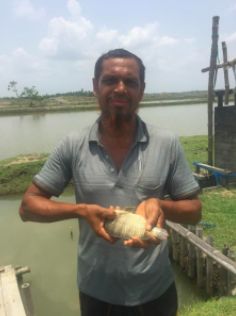Climate change is a matter of life or death for tens of millions of the world’s poorest people. But could recent extreme weather on this planet’s wealthiest nations speed up climate motion?
There is little doubt that climate change is an increasing priority for the richest nations. Extreme weather is causing dramatic rises in home insurance within the United States. With Europe reeling from the floods in Valencia, we will not see climate change as a distant threat. It is not something simply affecting poor people in Asia and Africa but a reality for everybody.
Fuelled by fresh fear from recent weather events, I even have high hopes for COP29. The annual summit attended by world leaders begins on Monday in Azerbaijan. COP is the decision-making body of the United Nations on climate change. The outcomes from this summit have enormous sway over the long run of our precious planet. And it isn’t only a talking shop. The first legally binding targets to scale back greenhouse gas emissions got here out of COP. The summit has served as a rigorous monitoring system, holding countries to account.
Even if the richer nations attending COP only got down to help themselves, it remains to be a win. After all these are the nations answerable for the best greenhouse gas emissions. So reducing emissions not only slows the ravages of climate change for them but for everybody. Yet, morally, we should always be doing much more to assist developing nations adapt to climate change. After all we’re those historically with the far greater carbon footprints causing the mess. We even have the broadest shoulders to assist bear the prices of sorting it out.

It is my hope that world leaders will see the sheer injustice of the climate crisis. It affects every area of life in so lots of the communities where we work. Yet cyclones within the US and flooding in Europe grab much more headlines. Recent flooding in Bangladesh and Myanmar has scarcely been reported within the UK. And there was little coverage of last month’s torrential monsoon rains in Nepal. The downpours caused a deadly landslide and chaos at The Leprosy Mission’s Anandaban Hospital.
Heatwaves, storm surges and flooding are disproportionately felt by vulnerable communities. And when a vulnerable community is hit by extreme weather, survival becomes the one goal. We know that extreme weather blocks the treatment pathway for diseases like leprosy. We are doing every little thing we will to assist people in a few of the world’s most vulnerable communities. But it’s a never-ending fight. World leaders simply must do much more to assist the world’s poorest people adapt to climate change.
I’d like to take them to the low-lying Sunderbans in India and Bangladesh. These are areas which can be increasingly being swallowed by water consequently of climate change.
Rezaul, pictured, lives along with his wife and two sons within the Bangladeshi Sunderbans. Rezaul’s life has been blighted with problems exacerbated by climate change. Cyclones, rising temperatures, rising sea levels and coastal flooding mean it isn’t any longer possible to grow crops. The soil is solely too salty. Instead individuals are turning to farming saltwater fish to survive.
After recovering from leprosy treatment, Rezaul took out a loan to rent a pond to farm saltwater fish. It was precisely the latest start he needed and had hoped for. But Rezaul’s hopes were soon dashed when Cyclone Remal made landfall in May. The storm left many individuals affected by leprosy homeless and without food. Rezaul’s pond was flooded and he was devastated to find he had lost all his fish. Yet he still needed to repay his loan with interest.
Thankfully, my colleagues in Bangladesh heard of Rezaul’s situation. They were capable of support him and his family and he has been capable of start saltwater fish farming again. But how long for, I ponder, until the subsequent disaster hits? I’d prefer to think if those attending COP29 could someway meet Rezaul then his story would stick with them. It could even propel them to assist people like him not only survive, but thrive in our ever-changing world.
Peter Waddup is Chief Executive of The Leprosy Mission.


